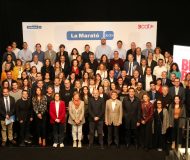

La Marató de TV3 Foundation will fund 8 cardiovascular health projects coordinated from the Sant Pau Research Institute, thanks to the funds raised in the last edition, which was specifically dedicated to these diseases. In total, Sant Pau will receive €2,296,961.25, which will be allocated to leading projects on diseases such as myocardial infarction, stroke, atherosclerosis, hypercholesterolemia, or arrhythmias, some of them in collaboration with other research centers. Additionally, researchers from Sant Pau are also involved in two selected projects coordinated from other centers.
Sant Pau is the leading center in the number of projects funded in the 2022 edition of La Marató de 3Cat. In total, 11.2 million euros were raised, which will be allocated to 71 research teams to carry out 37 projects in cardiovascular health to advance in the prevention, diagnosis, and treatment of diseases that are the leading cause of death in developed countries. Of the total selected projects, 15 are individual and 22 are coordinated between two or more research institutions.
Sant Pau is a hospital that has made history in Medicine, particularly in Cardiology, which has always been at the center of its interest. In fact, research on cardiovascular diseases is one of the 5 strategic areas of the Research Institute and is one of the clearest examples of translational medicine, as it aims to address questions and needs that arise directly from the patient’s bedside. The goal is for findings, from preclinical genetic studies in cellular and animal models to advanced clinical research, to return in the form of answers to the patient’s bedside.
Sant Pau has witnessed the development of cardiology: it was the first hospital in Spain to perform a heart transplant and continues to be an advanced reference in research in this medical specialty, constantly developing new therapeutic procedures, advancing in the understanding of basic cardiology, and continually improving the care of cardiac patients.
“We are very pleased and grateful to La Marató,” says Dr. Jordi Surrallés, director of the Sant Pau Research Institute, highlighting the positive results of this year’s call and expressing his commitment to continue promoting research in this field. “In the coming years, we will work hard to invest these resources obtained thanks to La Marató to promote the pursuit of excellence and quality that characterizes us.”
One key to success is Sant Pau’s strategic commitment to promoting translational research: the incorporation of clinicians and basic researchers in strategic areas, such as cardiovascular, working together to provide the best solutions to patients as soon as possible.
Acute myocardial infarction is a common cardiac pathology that often leads to heart failure and represents a significant burden on healthcare systems and associated costs. This project focuses on the use of high-density lipoproteins (HDL) modified through bioengineering to reduce cardiac damage and promote healing in cases of myocardial infarction. Through the identification of key constituents of HDL and the creation of HDL nanoconstructions, this innovative therapy aims to enhance cardiovascular protection.
The project focuses on the body’s ability to detect and repair tissue damage, especially in endothelial cells of the cardiovascular system, which play a crucial role in detecting and correcting anomalies. The study concentrates on “patrolling” monocytes that, similar to immunotherapy in oncological research, could promote repair instead of eliminating damaged endothelial cells. This could improve endothelial health and prevent cardiovascular diseases such as peripheral arterial disease, myocardial infarction, and stroke.
The project focuses on the study of an innovative technique for the treatment of cardiac arrhythmias called pulsed field ablation (PFA), which uses high-intensity electrical pulses. This technique induces a local biological phenomenon in the tissue called electroporation, leading to the elimination of the arrhythmic substrate. The challenge lies in distinguishing between areas of irreversible electroporation and reversible electroporation around the treated area, as the latter may lead to an overestimation of properly treated areas. The project aims to understand these differences and develop precise detection methods. Additionally, the transient narrowing of coronary arteries during PFA application is addressed by exploring strategies to prevent it. Finally, the use of reversible electroporation in cardiac tissue is considered as a possible way to administer active compounds and personalized treatments. The research is based on a multidisciplinary approach and seeks to improve the effectiveness and safety of PFA in the treatment of arrhythmias.
In an effort to combat stroke, one of the leading causes of death and disability in adults, this innovative project focuses on epigenetics as a key element. With the aim of improving stroke prevention and treatment, the research team investigates how epigenetic changes can influence risk factors and the progression of the pathology. This opens the door to potential medications, including “Epidrugs” or epigenetic drugs, for the prevention and treatment of strokes. This approach could have a direct impact on patients and individuals with stroke risk factors.
This project aims to investigate the genetic complexity of ischemic stroke in the Spanish population to identify differential genetic risk factors between men and women based on the etiology of the stroke they have experienced. Through various methods, such as genome-wide association studies and epigenomic association studies, the project aims to identify new drugs and pharmacological targets that could be useful for stroke prevention and risk stratification in patients.
Abdominal aortic aneurysm is a pathological dilation of the aorta, which is generally silent and can eventually rupture. The mortality rate in case of rupture is very high. This innovative project collects clinical, personal, genetic, and blood marker data from patients with this disease to develop a predictive tool capable of identifying patients at high risk of aneurysm rupture. Additionally, the project explores the effect of new drugs on aneurysm growth, impacting both prediction and disease prevention.